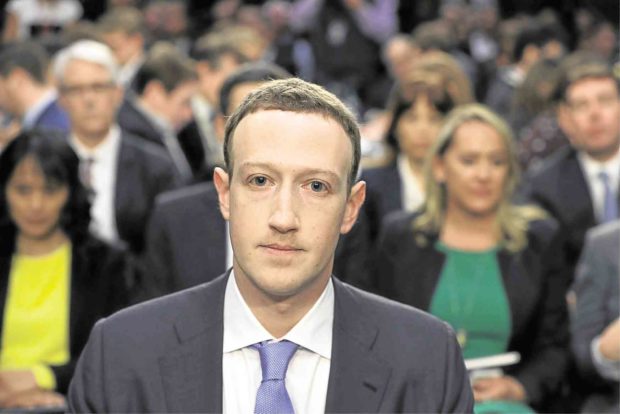Facebook CEO Mark Zuckerberg has been directed by the country’s privacy watchdog to cooperate with an investigation of the improper sharing of the personal information of more than 1 million Filipino users of the social media platform with the British political consulting company Cambridge Analytica.
In an April 11 letter to Zuckerberg made public on Friday, the National Privacy Commission (NPC) said the investigation was intended “to determine whether there is unauthorized processing of personal data of Filipinos, and other possible violations of the Data Privacy Act.”
The NPC’s move followed a decision by EU privacy watchdogs to look deeper into the harvesting of personal data from social networks for economic or political purposes.
Outside the United States, the Philippines had the largest amount of user data acquired by Cambridge Analytica, with 1.18 million accounts in the country affected, according to the NPC.
“As the Philippine data privacy authority, we are directing you to furnish this commission with information relevant to the processing of Facebook data of affected Filipinos, and how personal data is generally shared with third parties using your platform,” the NPC told Zuckerberg.
“Submit to us the documents required within 15 days from receipt. The failure on your end to comply with these requirements will prompt us to take further corrective actions to protect the interests of Filipino data subjects,” the letter said.
‘Improperly shared’
The letter was signed by NPC Commissioner Raymund Liboro and his two deputies.
It did not specify what actions the NPC would take if the documents were not submitted.
The watchdog sought documentation on the actions taken by Facebook when it discovered the unauthorized processing of user data.
Private data from about 87 million Facebook users worldwide was “improperly shared” by Cambridge Analytica through software developed by data scientist Aleksandr Kogan.
The NPC noted that Kogan was required by Facebook to destroy the data that were collected and processed outside its terms of service and that Cambridge Analytica’s data science officer had confirmed the information was destroyed.
“Kindly submit documentation between Facebook and Cambridge Analytica, and any evidence which led Facebook to believe that the data had indeed been destroyed, as well as any documentation of the extent of information shared between Facebook and Dr. Kogan, and from Dr. Kogan to Cambridge Analytica,” it added.
A Facebook spokesperson said the company was committed to protecting people’s information and is engaged with the Philippines’ privacy watchdog.
“We’ve recently made significant updates to make our privacy tools easier to find, restrict data access on Facebook, and make our terms and data policy clearer,” Facebook said.
Recent research has shown Filipinos to be among the most active social media users in the world, spending on average more than four hours a day on platforms like Facebook.
Cambridge Analytica has counted US President Donald Trump’s election campaign among its clients.
A Hong Kong newspaper has said several people involved in President Duterte’s 2016 election campaign had met in 2015 with Alexander Nix, the now-suspended chief executive of Cambridge Analytica.
Those people said the meeting with Nix was during a lunch break at an information technology seminar in Manila and there has been no contact since.
Presidential spokesperson Harry Roque on Tuesday said that Mr. Duterte’s election campaign did not rely on information bought from anybody, nor did it hire Cambridge Analytica’s services.
Duterte campaign
Returning from his trip to China on Thursday, Mr. Duterte dismissed reports that his campaign may have benefited from the Facebook data.
“I had no Cambridge, Cambridge … All that I had was just a simple campaign,” Mr. Duterte said.
He said that during a massive rally in Luneta days before the elections, he asked those who believe in God, in the priests and those against killing drug offenders not vote for him.
“Then I said, ‘Those who want to go to hell and kill the druggies, vote for me.’ See what happened,” he said.
“Also why would I pay that stupid Cambridge to run my campaign? The more I’ll lose,” he added. —WITH REPORTS FROM FRINSTON LIM
